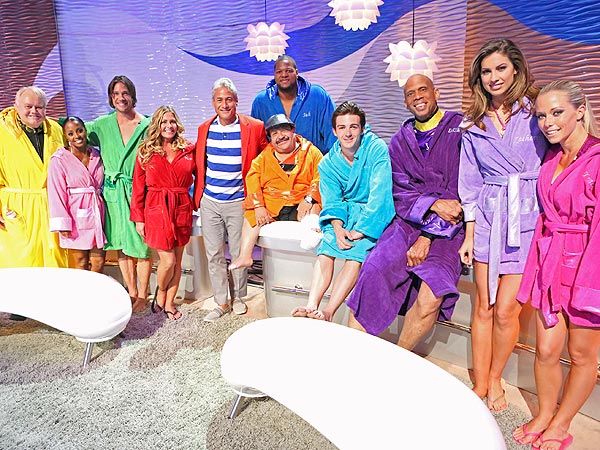Or does it?
PEOPLE.com readers have expressed concern that the ABC reality competition poses a real threat to its participants – that the show may simply be too dangerous.
After all, Rory Bushfield ruptured an eardrum in a botched entry, Katherine Webb could no longer compete after an injury and Nicole Eggert was left bruised and swollen from a dive.
And when Kendra Wilkinson stepped down from the competition, she spoke up about her perception of the perils of the sport. "Every morning I would wake up and be shaking," she told PEOPLE earlier this month. "It's a really risky show. I related jumping off the high board into the water to jumping to my death. That's how big of a deal it was. To me, it really meant risking my life."
So we decided to do some investigating.
"Every sport has its hazards, but diving requires many skill sets in order to become proficient. This poses a tremendous challenge," legendary diver and Splash coach Greg Louganis tells PEOPLE of the risks that celebrities take competing on the show. A statement from Splash production company Eyeworks USA says that safety "is the number one priority ... All the contestants have been provided the best possible medical evaluation and care." Adds Louganis: "Our goal is to keep them safe."
To that end, he says that training began long before stars hit the water. "We started with a boot camp to assess our celebrities and get a base line. That really informed our training path," he says, adding that the stars practice on a trampoline with a spotting harness, and a water harness while learning their dives.
As for injuries divers can face if they perform improperly, "Oh sure, ask me this question?" jokes Louganis, who famously sustained a dramatic head injury at the 1988 Seoul Olympics. "Boards sometimes get in the way on certain dives no matter how skilled you are," he says.

The cast of Splash, from left: Louie Anderson, Keisha Knight-Pulliam, Rory Bushfield, Nicole Eggert, Greg Louganis, Ndamukong Suh, Chuy Bravo, Drake Bell, Kareem Abdul-Jabbar, Katherine Webb and Kendra Wilkinson
Kelsey McNeal / ABC
"On impact, divers can dislocate a shoulder," Louganis says. "Usually, we see this in platform diving, and from overuse or repetition." And landing on the side of one's head could result in a hurt or punctured eardrum, as fans saw with Bushfield.
The X-Games star has "no fear – zero!" says Lougains. "I thought that was incredibly cool until he lost focus in one training session, and while learning some new mechanics, he landed on his ear and busted his ear drum."
As for Katherine Webb's competition-ending injury, neither she nor the show would comment on type of injury she sustained.
Not That Dangerous – Or That Difficult?
While viewers have seen a slew of crashes on the reality competition, one top diving coach points out that the drama is simply played up for the cameras – and what you see on television isn't as difficult as the average fan might think.
USC's 14-year head diving coach Hongping Li has led his athletes to seven NCAA titles, and he's been tuning in to Splash in his spare time.
"The focus on the danger side, or the injury side, I think it's what the TV audience wants," he says. "I believe it has a lot to do with ... making people more interested in watching. They promote that intentionally. People like to watch people crash! They like to see people in danger."
So just how difficult are the types of dives the celebrities perform?
"They're particularly easy, in my view," says Li, adding that he's heard divers joke that the stars on the reality show "are not diving, they fall off [the diving board]! It's not very difficult at all."
But that doesn't mean Li isn't impressed with the celebrities' courage and the work they put into learning the sport.
"A few of them have done some somersaulting, and that is impressive for the amount of time they've had to train. To me, that is incredible. I would say the dives that they do, for how little time they train, [are] impressive. But to us, it's really novice level."
And while injuries do happen, with the proper training, they aren't as commonplace as Splash – or even Olympic coverage – might have viewers believe.
"I feel diving is much less dangerous than any other sport," says Li. "If you learn properly and if you learn with good instruction and [do age appropriate dives], I think that you can avoid all that."
"Diving, like any other sport, involves some risky elements, definitely. But instead of focusing on how many times no one gets hurt in how many years of diving without any injuries, they replay that moment of someone hurt, someone hitting the board over and over, [even if] that happened only once out of thousands of times."
In conclusion, asked if he thinks Splash is too dangerous, Li replied emphatically, "Absolutely not." Of course, that's not the reason he's watching.
"It's great to see diving being shown on TV in the regular week," says Li. Usually, "the only time people can watch diving is during the Olympic Games – we hardly have any TV time. I hope that it will help focus on the positives of our sport."
No comments:
Post a Comment